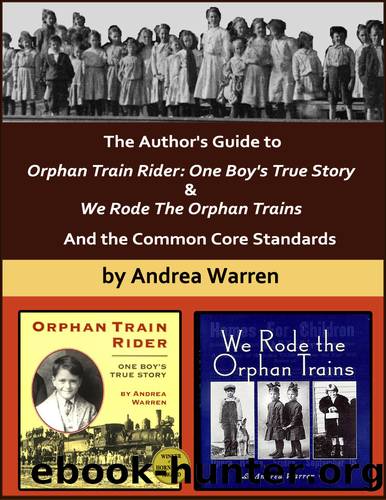The Author's Guide to Orphan Train Rider by Andrea Warren

Author:Andrea Warren
Language: eng
Format: epub
Publisher: Andrea Warren
When asked by one boy if he had a choice would he ride the train again to come to Nebraska, Swedenburg slowly shook his head and said no. Swedenburg asked the boy how he would feel to be taken from his family and put in a new home and the boy's face fell as he looked at the floor.
Yet in my interview with Fred-all of it carefully transcribed on tape and then sent to Fred to give him the opportunity to change anything he wished-he discussed his fears of being sent back to New York and he complimented the agents who worked hard "trying to make sure each child was okay." I also asked him about his decision not to meet his birth mother: "Later, when I found out how she treated Howard, I was glad I didn't stop," he says. "That was when I realized why we were put on that train in 1925." And when he learned of the "scandalous neglect" that led to Howard's and his removal from their birth family, he closed the door to his past.
My point is, writers can manipulate the material to make it reflect their own point of view about something. I can do it too. I have tried to stay objective, but I am an adoptive parent. Do you see any places where I let my bias toward adoption show?
I'll tell you my overall biases and you can search for particulars. I've always felt that the orphan trains were a well meaning--if flawed--attempt to find homes for children who needed them. I think the program had two particular weaknesses.
The first was the local approval committees. Usually they were prominent townspeople who had no particular credentials to allow or deny applications of families wanting to take in an orphan train rider, but they should have been able to spot those folks who were only looking for workers.
The second was following with the placement to be sure that riders were in good homes. Most agents tried to do this, but sometimes families moved and the agents lost track of them, or families lived in remote locations that were difficult to visit. Some children were threatened with severe punishment if they complained about anything during a visit from an agent.
Knowing that I have these biases, do you think I presented a balanced view of the orphan train story?
Do you think I should have written my story about a rider who got a bad home and hated it? I met riders who had difficult lives and were bitter about it, but what kind of book would that have been? Lee's gratitude for getting good parents appealed to me, as did his desire to help promote the history of the orphan trains. I was drawn to his plight of wanting to return to his father, of feeling responsible for his two younger brothers, and, as I stated earlier, for his concern over losing the pink envelope. I also loved how readily his new parents accepted him (there's my bias showing).
Download
This site does not store any files on its server. We only index and link to content provided by other sites. Please contact the content providers to delete copyright contents if any and email us, we'll remove relevant links or contents immediately.
| Customs, Traditions, Anthropology | General |
| Sociology |
Eagle Warrior by Gill Lewis(282)
Just Ella (The Palace Chronicles Book 1) by Margaret Peterson Haddix(232)
Aussie Kids: Meet Eve in the Outback by Raewyn Caisley(200)
Dangerous Skies by Suzanne Fisher Staples(193)
Eb & Flow by Kelly J. Baptist(186)
A New History of Immigration by Jaclyn Backhaus(182)
MAYA by Sheri Bell-Rehwoldt(181)
The Runaway Santa by Anne Margaret Lewis(171)
T-Rex Would Not Make a Good Knight by Thomas Kingsley Troupe & Steph Calvert(168)
Heroes of the Water Monster by Brian Young(166)
Marie van Brittan Brown and home security by Virginia Loh-Hagan(164)
The Mysterious Message by Disney Books(162)
Flight Path by David Hill(156)
The Mystery of Treasure Island by Moxham Paul(156)
Return to Mystery Mesa by George Goldthwaite(153)
Foghorn Flattery and the Dancing Horses by Barbara Steiner(149)
Sunny and the Snowy Surprise by Laura Dower(148)
The Thumb in the Box by Ken Roberts(145)
Control Under Fire by M. Zachary Sherman(140)
